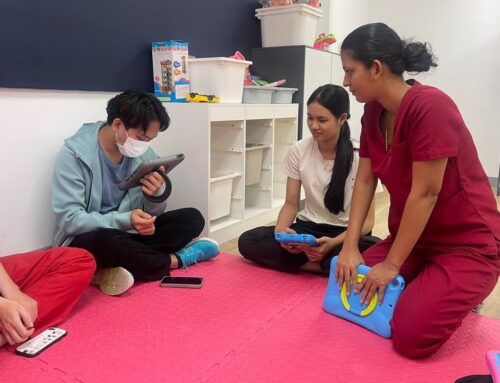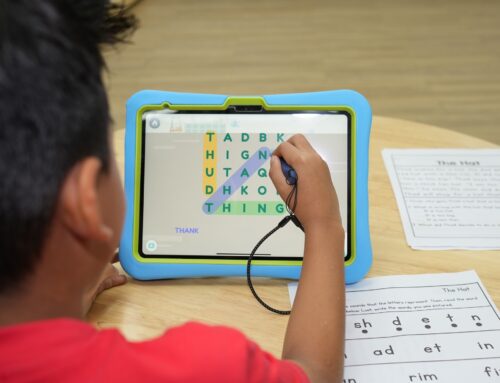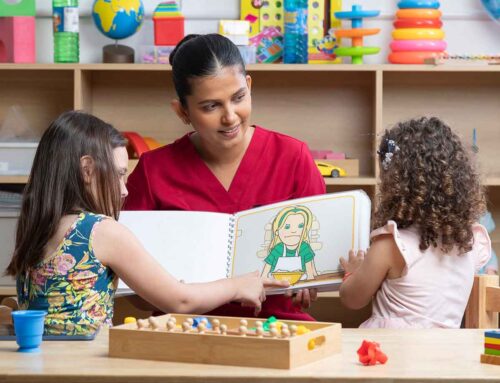Music has long been known to move people emotionally—but did you know it can also help children speak more fluently? At OrbRom Center in Phnom Penh, Cambodia, our speech therapists often integrate music and rhythm into sessions to support children with speech delays, stuttering, and other fluency challenges. Using rhythm-based exercises helps strengthen timing, breathing, and coordination — all essential skills for clear and confident speech.
The Connection Between Music and Speech
Music and speech share several key brain pathways. Both rely on rhythm, timing, and auditory processing. When children listen to or create rhythmic patterns, they are effectively training their brains to process speech sounds more efficiently. This overlap makes musical activities—like singing or clapping—to be powerful tools in speech therapy.
At OrbRom Center’s Speech Therapy Program, therapists often use songs, rhymes, and rhythm-based cues to encourage fluency. For children who stutter or have difficulty producing smooth speech, maintaining a rhythmic beat helps regulate the flow of words and reduces speech tension.
For example, a therapist might use slow rhythmic tapping to guide a child’s breathing and pacing while speaking. Over time, this builds smoother, more natural speech patterns without the child feeling pressured to “speak perfectly.”
How Music Enhances Speech Fluency
1. Rhythm Supports Speech Timing
Speech fluency depends heavily on timing. Many children with speech disorders struggle with coordinating breathing, articulation, and pauses. Musical rhythm provides a natural framework that encourages consistent pacing.
When a child speaks along with a rhythmic beat, their speech muscles learn to follow predictable timing patterns—similar to keeping tempo in music. This helps reduce pauses, repetitions, and blocks often seen in stuttering or cluttering.
Therapists at OrbRom Center might incorporate clapping games, drum beats, or marching activities to make rhythm-based speech training fun and engaging.
2. Singing Builds Confidence and Expressiveness
Singing transforms speech into melody, which engages both sides of the brain—the left (language processing) and the right (music and emotion). For children who feel anxious or frustrated about speaking, singing can lower barriers and reduce performance pressure.
A simple activity like singing “hello” or greeting songs during sessions encourages expressive communication in a relaxed, joyful way. Many children with speech delays find their first fluent words through music before transitioning to spoken phrases.
This approach aligns with research showing that melodic intonation therapy—a method using melody and rhythm—can improve speech in children with apraxia, stuttering, or autism-related communication challenges.
3. Music Encourages Repetition and Memory
Repetition is key in speech therapy. Songs and rhythmic chants make repetition enjoyable, which strengthens learning and memory. When children sing their favorite song or repeat rhythmic patterns, they are practicing sound sequences, syllables, and intonation—without even realizing it.
At OrbRom Center, therapists often adapt familiar songs in both English and Khmer to fit each child’s communication goals. For example, singing “Head, Shoulders, Knees, and Toes” helps develop articulation, while rhythmic storytelling builds sentence flow and comprehension.
The Role of Rhythm in Stuttering Therapy
Children who stutter often struggle with the timing of their speech. Integrating rhythm helps regulate the pace of speech production. Clapping or tapping exercises help children become more aware of syllables and breathing, leading to smoother transitions between words.
Our speech-language specialists in Phnom Penh frequently use rhythmic pacing tools to teach children how to control speech onset and maintain flow. Over time, these activities build confidence, reduce anxiety, and encourage natural speech rhythm in everyday communication.
You can read more about stuttering and fluency treatment in our guide on stuttering causes and treatment types.
Integrating Music Into Speech Therapy Sessions
Speech therapy doesn’t have to feel clinical or repetitive. At OrbRom Center, our therapists blend structured techniques with musical play, creating a motivating learning environment.
Some of the activities include:
-
Singing-based articulation practice – pairing songs with target sounds.
-
Beat synchronization exercises – using instruments to maintain speech tempo.
-
Rhythmic breathing drills – training control and coordination.
-
Call-and-response games – encouraging turn-taking and spontaneous speech.
These activities make therapy enjoyable for both children and parents. Families are also encouraged to continue rhythm-based activities at home. For instance, clapping syllables during story time or singing daily routines (like “brush your teeth” or “let’s go to school”) reinforces progress made in sessions.
For home practice ideas, explore our blog on top 10 speech therapy exercises you can try at home.
Why Music-Based Therapy Works So Well in Cambodia
Music is deeply rooted in Cambodian culture. Traditional instruments like the roneat and tro offer rhythmic patterns ideal for speech and language development. Integrating local songs makes therapy more relatable and culturally meaningful for children.
At OrbRom Center in Phnom Penh, our therapists adapt global evidence-based techniques to the local context—combining the science of speech therapy with the joy of music. This holistic approach not only supports speech fluency but also fosters confidence, creativity, and social connection.
Conclusion: Finding the Rhythm in Every Voice
Music and rhythm are more than just fun—they are powerful tools for improving speech fluency and communication skills. Through rhythmic play, singing, and melody, children learn to express themselves with confidence and joy.
At OrbRom Center, our speech therapy services in Phnom Penh help children discover their voice through creative and evidence-based methods like music integration. Whether your child is struggling with stuttering, articulation, or confidence in speaking, we believe every voice has a rhythm waiting to be found.
We are the only Preschool specialized on children with special needs in PhnomPenh.
- Internationally qualified teachers
- Cambodia’s largest sensory room
- Outdoor swimming pool
- Covered outdoor playground
📞 Phone: 077.455.993
Telegram Link: https://t.me/OrbRom





